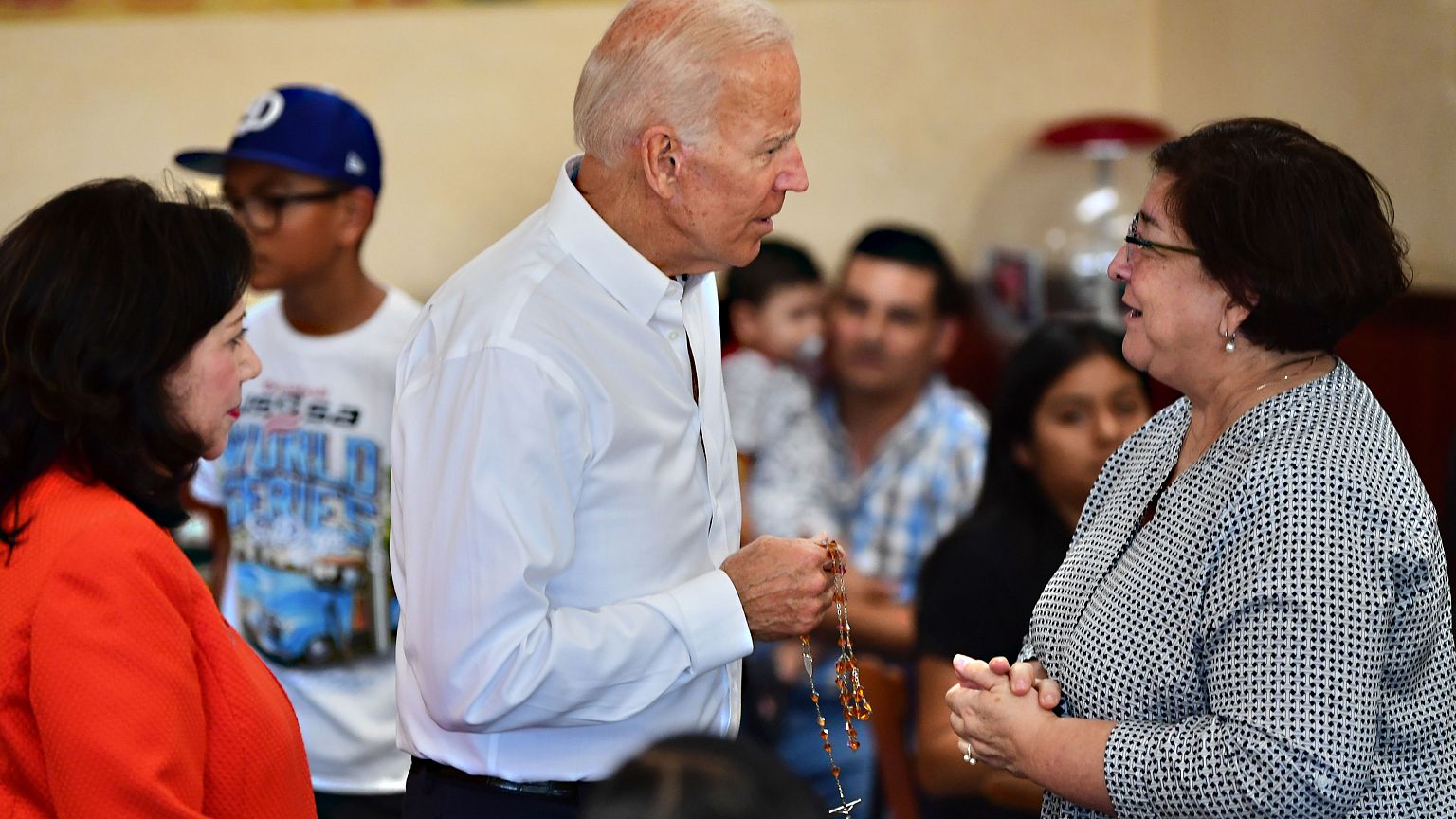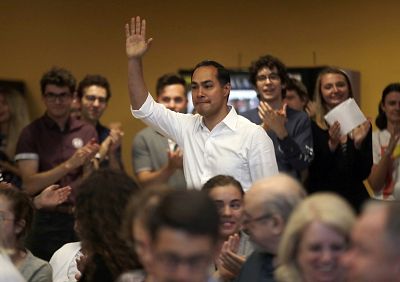For the first time, Latino elected officials and voters are getting a real full-court press from presidential hopefuls — because they might pick the nominee.
LAS VEGAS — Last December, a series of presidential hopefuls began courting Yvanna Cancela.
 ADVERTISEMENT
ADVERTISEMENT
 ADVERTISEMENT
ADVERTISEMENT
At 31, the former political director of the state's legendarily powerful culinary workers' union and campaign operative for then-Sen. Harry Reid, D-Nev., is Nevada's first Latina state senator.
Ultimately, it was former Vice President Joe Biden who won the sweepstakes: When he called shortly before announcing his candidacy in April to talk about the state's politics, Cancela cut him off and offered her endorsement, citing his "leadership" qualities as the determinative factor.
Any campaign would kill to have her making its case in this city's union halls and community centers because her endorsement comes with much more on-the-ground political know-how and muscle than most, and, as a young woman of color who has fought for workers and gone to war with drug companies, she's both a practitioner of the David-vs.-Goliath populism that ignites the party's base and an embodiment of sought-after demographics.
"Nevada is the early state that most reflects what what the rest of the country really looks like," Cancela said in an interview at a hipster coffee shop just outside her district Friday — the day before she was scheduled to campaign with Biden here.
Specifically, it's the first state on the primary calendar with a mix of white, black and Hispanic voters, and that gives it even more importance than usual as both a potential bellwether and influencer in the 2020 Democratic presidential primary.
For the first time, Latino elected officials and voters — here, and in other key primary states — are getting a real full-court press from Democratic contenders during the early stages of the primary process. The reason for the shift is simple: this time around, they could play a much more prominent role in picking the nominee.
Depending on how the race unfolds, Latinos might even end up being the key to the contest.
That's a function mostly of heavily Hispanic states, including California and Texas, moving up on the primary calendar at the same time that the chances for a protracted, delegate-by-delegate fight among several candidates appear to be more likely than ever. The possibility of African American voters splitting among several candidates for the first time in several presidential primary cycles also raises the stakes for candidates in trying to get an edge with Latino voters.
"What's exciting is that by March 17 of next year, 70 percent of all eligible Latinos will have been able to cast a vote," said Maria Teresa Kumar, president and CEO of Voto Latino. "That's unprecedented."
But for the campaigns, that also presents a tremendous logistical challenge — and one that may be prohibitively expensive for all but the best-funded among them. That helps explain why they have been eager to reach out to potential organizers and surrogates early on and to use national platforms as much as possible to communicate with Latino audiences.
Candidates who want to win simply can't afford to wait to build a following among Latino voters.
Together, California and Texas, where Hispanics account for nearly 40 percent of the overall population, account for more than 15 percent of the elected delegates to next summer's Democratic convention. Both states wrap up voting next year on March 3 — Super Tuesday — which is the same day that several southern states with heavily African American Democratic electorates and a smattering of other states vote.
To win any delegates in those states, a candidate has to win either 15 percent statewide or at least 15 percent at the district level. In California, there are 53 congressional districts that award delegates, and in Texas there are 31 state Senate districts that do so.
In California, the Hispanic population ranges between 370,000 and 650,000 in 15 of the 53 districts — meaning it accounts for 50 percent or more of the total population in those districts — and there is no district in the state in which it is less than 10 percent of the population. Likewise, in Texas, all of the state Senate districts are at least 10 percent Hispanic, and several are majority-Hispanic.
A Quinnipiac poll released this week showed Sen. Kamala Harris, D-Calif., leading the field in her home state with 23 percent, Biden at 21 percent, Sen. Bernie Sanders of Vermont at 18 percent, Sen. Elizabeth Warren, D-Mass., at 16 percent, and no other candidate with more than 3 percent statewide.
Warren has been in touch with the leadership of Latino advocacy organizations since long before she launched her campaign, according to sources who spoke to NBC News, and Biden's outreach has included a fully bilingual website, bilingual advertising and the first candidate meeting with the Congressional Hispanic Caucus.
Harris, D-Calif., has put immigration issues at the forefront of her agenda in the Senate since taking office in 2017. One of the co-chairs of her campaign is Dolores Huerta, an iconic figure in civil and labor rights struggles who worked side by side with Cesar Chavez, and one of her top aides, Emmy Ruiz, has earned a reputation for running savvy, effective operations in heavily Latino states.
Former Housing and Urban Development Secretary Julián Castro, the only Latino candidate in the race, gained traction in the first Democratic debate in Miami last month during a tussle with former Rep. Beto O'Rourke — a fellow Texan — over O'Rourke's reluctance to abandon penalties for people who cross the U.S.-Mexico border illegally.
Castro's early appeal to Latinos included making Puerto Rico his first stop on the campaign trail and putting out the first comprehensive education and immigration plans — the latter of which won praise from Warren.
O'Rourke and Sen. Cory Booker, D-N.J., spoke Spanish at length during the first Democratic debate to try to establish their bona fides in the Hispanic community, even though the event was simulcast in Spanish on Telemundo.
In a Univision pollreleased earlier this month after the first set of debates, Harris led among Hispanic voters, with 22 percent. Castro was second with 18 percent, followed by Biden and Sanders at 16 percent apiece and Warren at 9 percent.
The results suggest that, as with other Democrats, many Hispanic voters across the country have yet to form opinions about leading candidates. About a quarter of those polled said they either had no opinion of, or hadn't heard enough from, Biden, Sanders or Harris, with even more saying the same of the other candidates.
That helps explain why it's so important for these candidates to reach out to potential allies in Latino communities in important states quickly.
While Nevada has been third on the calendar since 2008 — meaning Latino elected officials here have become somewhat accustomed to early interest from presidential candidates — the phenomenon is newer for their counterparts from other states.
Rep. Lou Correa, D-Calif., said that Biden's meeting with about a dozen members of the Congressional Hispanic Caucus earlier this month may have been the first of its kind ever, not just of this presidential cycle.
"I think all of us are looking for respect, especially in an era when you have a president who referred to some Latinos as criminals and rapists," he said in a telephone interview with NBC News.
He said his decision is down to Biden and Harris, who contacted him to let him know that she was running.
"I want to continue to see the viability of both candidates," he said. "I think for Democrats the issue is who has the best perspective on taking back the White House, who has the message that will resonate with that middle voter."
Biden aides believe his position on health care will appeal to Latino voters because it's largely aimed at strengthening and expanding on the Affordable Care Act — known colloquially as Obamacare — rather than a "Medicare for All" plan that would replace the law enacted when he was vice president.
Between 2013 and 2017, the rate of uninsured among non-elderly Hispanics fell from 30 percent to 19 percent, a bigger percentage dip than among African Americans or whites, according to data from the Kaiser Family Foundation. Kaiser tracking polls show that Obamacare's favorable rating among Hispanics is 52 percent, compared to a 27 percent unfavorable rating — and the favorable number has been above 70 percent at times in recent years.
But Biden's vulnerability with Latino voters also comes from his time as vice president: Obama was criticized heavily for deporting large numbers of undocumented immigrants and for failing to enact a comprehensive overhaul of the nation's immigration laws. He was asked about that when he met with the Congressional Hispanic Caucus, as Rep. Linda Sanchez, D-Calif., pressed him for — and got — a commitment to make immigration reform a priority if he is elected president, according to Correa.
"He said he would expend political capital — my words, not his — to make sure immigration reform would happen," Correa said.
"I believe that the vice president is committed not only to earning the Latino vote, but to enacting an immigration platform that is comprehensive," Cancela said.
But she emphasized that Biden's appeal to her, and to many Hispanic voters, will be the same as it is to non-Hispanic voters: a focus on expanding the ranks of the middle class and making sure that families don't drop out once they get there.
For now, most of the work is going on behind the scenes, as campaigns work to build alliances with state and local lawmakers and the early seeds of infrastructure in key states.
"It's too early to make the assessment" of which candidates are doing well with Latino voters in which parts of the country, said Albert Morales, senior political director at Latino Decisions. If the race stays close, the work the campaigns are starting to do now in Hispanic communities now could pay big dividends in the party's nomination fight.
"It's going to be a head-scratcher for a lot of folks who don't understand the nuances behind the delegate-selection process," he said.















